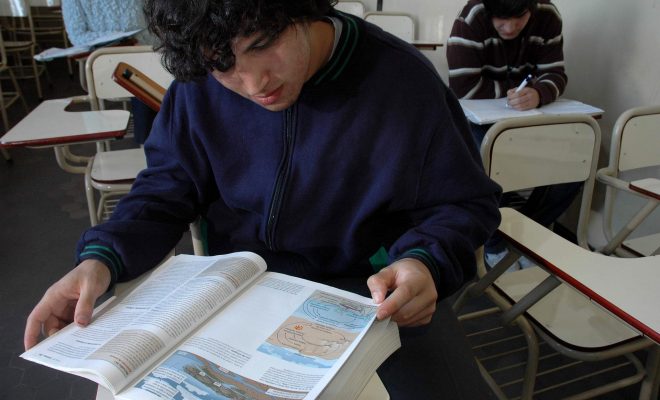Zuckerberg is ploughing billions into ‘personalised learning’ – why?

Natalia Kucirkova, The Open University and Elizabeth FitzGerald, The Open University
Facebook founder Mark Zuckerberg believes personalised learning is the answer to many of education’s current woes, and is one of the four key areas that he and his wife Prescilla Chan’s US$45 billion Chan Zuckerberg Initiative will fund.
While some argue whether this is a philanthropic act or a shrewd business strategy, others will ask: what is personalised learning anyway? Because despite some politicians’ enthusiastic endorsements of personalised education, there’s still no clear definition.
Many in education would argue that personalised learning is what all good teachers do as a matter of course – modifying learning materials and teaching styles to accommodate the different ways pupils learn. Others see it as an antidote to top-down, centralised school bureaucracy, with the term “personalised” used interchangeably with individual, learner-centered or customised. It’s far from clear how teachers are supposed to support such personalised learning with personalised resources on a per pupil basis, nor who should bear the costs of doing so.
Zuckerberg has a clear definition in mind, however. For him, personalised learning is about teachers “working with students to customise instruction to meet the student’s individual needs and interests”. Although the Chan Zuckerberg Initiative’s Personalised Learning Platform is not part of Facebook, the underlying principles are the same: human work is replaced by technology, algorithms provide users with content based on an analysis of their past behaviour and demonstrated interests. This is similar to how Facebook’s news feed works, and other commercial personalisation models based on text and behaviour analysis.
There has been much hype about the potential for new technology or approaches to disrupt education and, not unreasonably, there’s concern that investment in personalised learning may be a boost for Silicon Valley but a kick in the teeth for teachers.
The dangers of personalised learning
Zuckerberg’s idea of personalised learning has three major flaws. First, education has always been about acquiring knowledge and skills relevant to a profession, but also about acquiring general knowledge. By feeding children only the content they’re interested in, we may end up with many specialists and few generalists.
Second, while learners may cope poorly with trying to learn in a way that’s not suited to them, in the real world life will not always be so accommodating. Their lack of ability to compensate may mean they suffer as a result.

People are different, and learn differently too.
algogenius, CC BY
Finally, children’s preferences are not fixed – in fact they often change as immediate responses to the environment. To predict content relevant for children there needs to be sensitive, human-directed input – not automation. Otherwise we end up with what might be called de-personalised learning, and classrooms with little conversation between student and teacher. In subcontracting out teaching to technology, the risk is that the valuable social contact between students, teachers and parents that’s inherent to effective learning will be reduced.
There is also the issue of ensuring that children’s data is not misused. Recording children’s personal progress, preferences and needs poses a privacy risk if it is not managed properly. The recent example of Vtech, whose internet-connected childrens’ toys and gadgets were hacked revealing millions of images of children and chatlogs, illustrates the dangers – who’s going to decide what data is collected and how it is stored and used?
Personalised learning brings with it all manner of complex issues involving children’s agency, power, collaboration and dialogue (or lack of them). But it also brings exciting prospects for the future.
Where personalised learning could help
Motivation is crucial for effective learning, and personalised learning gives children a sense of ownership and relevance, while personalised assessments are regarded as effective.
These values are at the core of AltSchool, which recently raised US$100m (including from Zuckerberg, who funded its expansion). AltSchool is a community of micro-schools whose personalised learning experience involves collecting data about pupils’ attainment, grades and also memory test results and energy levels. This data is crunched together with the pupil’s interests and preferences to tailor the content.

Putting together a jigsaw of personalised learning.
Jason Devaun, CC BY-ND
So far we don’t know how well it works, or whether it works at all. What we do know is that this is only one vision of personalised learning, underpinned by evidence that is ambiguous at best. With Zuckerberg’s endorsement, the danger is that this could be the new kid, if not the only kid, on the education block. The end result would be undeserved kudos and the promise of a brave new (and unrealistic) world where the different between every learner can be accounted for.
A compromise approach
Other organisations combine user data with standard educational content, for example adaptive course-ware platforms such as those from Smart Sparrow or Pearson. Personalised learning by McGraw Hill allows educators to choose between the adaptive or customized study plans. The former adapts all topics to a learners’ pace, while the latter provides a course modified according to the teacher’s knowledge of what fits the students best.
If personalised learning is conceived of as the means to adapt and customise a pupil’s learning according to their needs as well as teachers’ experience and school requirements, it holds promise. As Mike Sharples and other Open University colleagues write in their Innovating Pedagogy 2015 report, personalised learning combined with emotional analytics, personal inquiry, dynamic and stealth assessment could be a very powerful combination.
But this requires developing the strategies which can marry the needs of children and teachers in education. This is something that takes time, conversation and collaboration, and cannot be hurried through by simply pouring millions of dollars into technology – even if your name is Mark Zuckerberg.
![]()
Natalia Kucirkova, Lecturer in Developmental Psychology, The Open University and Elizabeth FitzGerald, Lecturer in Educational Technology, The Open University
This article was originally published on The Conversation. Read the original article.





